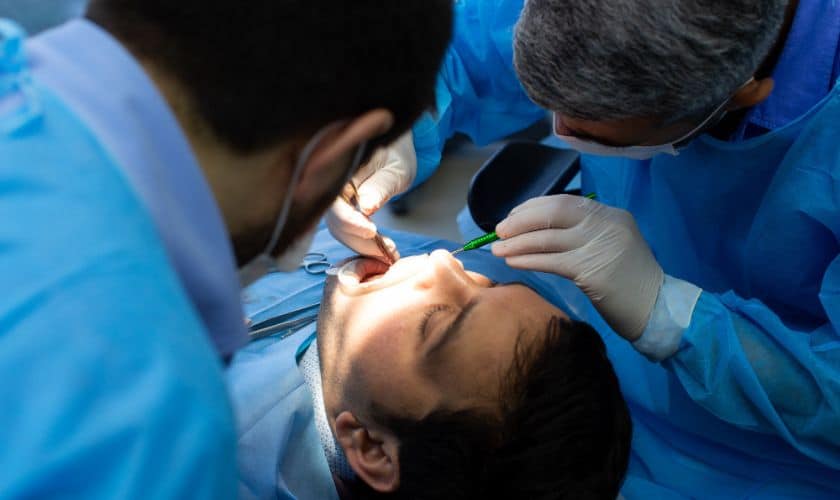
Oral surgery can be a daunting prospect, but with careful preparation and the right guidance, you can navigate it with confidence and ease. If you’re gearing up for oral surgery in Pasadena, CA, you’re in the right place. This step-by-step guide is your roadmap to a successful and stress-free oral surgery experience.
From understanding the importance of pre-operative consultations to post-surgery recovery tips, we will walk you through every crucial aspect. Whether you’re preparing for a tooth extraction, dental implant placement, or any other oral surgery procedure, the knowledge and preparation outlined here will help ensure a smooth journey towards improved oral health and overall well-being.
Choose the Right Oral Surgeon
1. Credentials and Experience: Prioritize oral surgeons who are board-certified and have extensive experience in the specific procedure you require. Research their qualifications, years of practice, and patient reviews to gauge their expertise.
2. Consultation and Communication: Schedule initial consultations with potential oral surgeons. Evaluate their ability to explain the procedure, answer your questions, and establish clear communication. A surgeon who listens to your concerns and makes you feel comfortable is crucial for a positive surgical experience.
Schedule a Pre-Operative Consultation
1. Understanding the Procedure: During the pre-operative consultation, your oral surgeon will explain the details of the upcoming procedure. This is your opportunity to gain a thorough understanding of what to expect, including potential risks and benefits.
2. Personalized Assessment: The consultation allows the surgeon to evaluate your specific dental condition, ensuring that the surgery is tailored to your needs. They will discuss your medical history, medications, and any pre-existing conditions to ensure a safe and effective procedure.
Understand the Procedure
1. Detailed Explanation: Your oral surgeon should provide a comprehensive explanation of the entire surgical process. This includes step-by-step details of the procedure, the type of anesthesia to be used, expected duration, and any potential variations based on your specific case.
2. Clarify Doubts: Use this opportunity to ask questions and seek clarification on any aspects of the surgery that may not be clear. Understanding the procedure thoroughly helps alleviate anxiety and ensures you are mentally prepared for what lies ahead.
Pre-Operative Instructions
1. Fasting Guidelines: Your oral surgeon will provide specific fasting instructions, which are crucial to ensure a safe procedure. Typically, patients are required to abstain from food and drink for a specified period before surgery to prevent complications during anesthesia.
2. Medication Guidelines: Discuss any medication you are currently taking with your surgeon. They will provide guidance on which medications to continue or discontinue leading up to the surgery. It’s essential to follow these instructions meticulously to minimize potential risks.
Plan for Recovery
1. Post-Operative Care Instructions: Your oral surgeon will provide detailed post-operative care instructions. Review these carefully and plan accordingly. This includes information on managing pain, swelling, and any potential complications.
2. Rest and Relaxation: Ensure you have a plan for rest and relaxation after the surgery. Arrange for time off work or other responsibilities as needed. Having a calm and stress-free environment at home is essential for a smooth recovery.
Arrange Transportation and Support
1. Transportation: Since you might be under the influence of anesthesia or discomfort post-surgery, arrange for someone to drive you to and from the surgical center or clinic. Having reliable transportation ensures your safety and convenience.
2. Supportive Companion: Having a friend or family member accompany you to the surgery and stay with you during the initial recovery period is valuable. They can provide emotional support, help with daily tasks, and ensure your comfort and well-being as you recuperate.
Prepare for Pain Management
1. Prescribed Medications: Discuss pain management options with your oral surgeon. They may prescribe pain medications for use after the surgery. Ensure you have these medications on hand before the procedure, so you’re prepared to manage any discomfort effectively.
2. Over-the-Counter Pain Relievers: In addition to prescribed medications, consider having over-the-counter pain relievers like ibuprofen or acetaminophen available as recommended by your surgeon. These can be helpful for milder discomfort during the recovery period. Always follow dosage instructions carefully.
Follow Dietary Guidelines
1. Soft and Liquid Diet: After oral surgery, particularly for procedures like extractions, follow your oral surgeon’s dietary recommendations. Typically, this involves consuming soft or liquid foods for the initial days to avoid placing stress on the surgical site.
2. Stay Hydrated: Maintain proper hydration by drinking plenty of water. Avoid alcohol and carbonated beverages, and refrain from using straws, as these can interfere with the healing process. Adhering to dietary guidelines promotes healing and minimizes the risk of complications.
Maintain Good Oral Hygiene
1. Gentle Brushing: Continue practising good oral hygiene, but be gentle around the surgical site. Use a soft-bristle toothbrush to clean your teeth, avoiding the immediate area of the surgery. Maintaining oral hygiene is essential for preventing infection and promoting healing.
2. Rinse as Instructed: Your oral surgeon may recommend a special mouthwash or saline solution for rinsing your mouth. Follow their instructions diligently, as this helps keep the surgical site clean and reduces the risk of complications.
Source : DeJesus Dental Group
In conclusion, preparing for oral surgery in Pasadena, CA, is a meticulous process that involves choosing the right surgeon, understanding the procedure, and following preoperative and post-operative instructions. Planning for recovery, arranging support, and being proactive in pain management and dietary choices contribute to a smoother and more successful surgical experience. By adhering to these steps, individuals can ensure a safe and effective oral surgery, leading to improved oral health and overall well-being.



